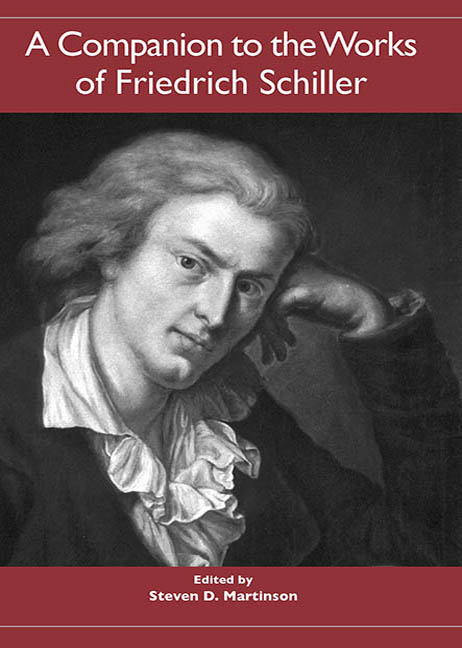Book contents
- Frontmatter
- Dedication
- Contents
- Acknowledgments
- The Works of Friedrich Schiller
- Editions and Abbreviations
- Introduction: Schiller and the New Century
- Intellectual-Historical Settings
- Major Writings
- Die Räuber: Structure, Models, and an Emblem
- Kabale und Liebe Reconsidered
- Great Emotions — Great Criminals?: Schiller's Don Carlos
- Concerning Aesthetic Education
- “On the Shores of Philosophy”: Schiller's Lyric Poetry, 1795
- Wallenstein
- Maria Stuart: Physiology and Politics
- Die Jungfrau von Orleans
- Wilhelm Tell
- Schiller's Legacy
- Works Cited
- Notes on the Contributors
- Index
Wilhelm Tell
from Major Writings
Published online by Cambridge University Press: 28 April 2017
- Frontmatter
- Dedication
- Contents
- Acknowledgments
- The Works of Friedrich Schiller
- Editions and Abbreviations
- Introduction: Schiller and the New Century
- Intellectual-Historical Settings
- Major Writings
- Die Räuber: Structure, Models, and an Emblem
- Kabale und Liebe Reconsidered
- Great Emotions — Great Criminals?: Schiller's Don Carlos
- Concerning Aesthetic Education
- “On the Shores of Philosophy”: Schiller's Lyric Poetry, 1795
- Wallenstein
- Maria Stuart: Physiology and Politics
- Die Jungfrau von Orleans
- Wilhelm Tell
- Schiller's Legacy
- Works Cited
- Notes on the Contributors
- Index
Summary
1.
Wilhelm Tell (1804) — unique in Schiller's oeuvre in that it is subtitled “Schauspiel” — has always been taken to be the most easily accessible of Schiller's plays, appealing primarily, if not exclusively, to children and the Swiss, to opera lovers appreciating the son et lumière, as well as to connoisseurs of familiar quotations, and, just possibly, to aficionados of kitsch, be they naïve or sophisticated. No wonder at least one critical intellectual, Swiss as it happens but no doubt speaking for many others, fantasized about a “Schiller without Wilhelm Tell” (Muschg). Schiller himself had hoped that Tell would appeal to the “heart and senses” and be “effective on stage,” in other words, that it would be a “Volksstück,” “für das ganze Publikum.” Whether taking such hints or not, audiences have usually experienced the work as a celebratory play or a festive event, a Festspiel jubilating about the victory of a popular sort of idealism that restores the sovereignty of the people with unfailing aplomb. Tell was something for everybody, then (who could be against it, other than totalitarian regimes, such as Hitler's [Fetscher, 152–53]) — and something for all seasons. But that is where popularity becomes problematic. For Schiller's celebration of an event of thirteenth-century Swiss history is so rhetorically vague and operatically enthralling that it gained a dubious kind of universality and adaptability allowing it to be appropriated by a motley crew of ideologies. After all, hadn't Schiller himself instrumentalized his chosen moment in medieval local history to express concerns about his own political present (Fink, 59)? So why not look for timely applications at a later period? As a result, Tell came to be a multipurpose political play.
Although the men of the twentieth of July right-of-centre conspiracy against Hitler may not have claimed Schiller's Tell as an archetypical model themselves, recent scholars have confidently done so on their behalf (Müller-Seidel, 143; Herbst).
- Type
- Chapter
- Information
- A Companion to the Works of Friedrich Schiller , pp. 247 - 268Publisher: Boydell & BrewerPrint publication year: 2005



